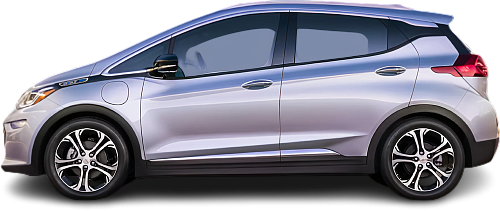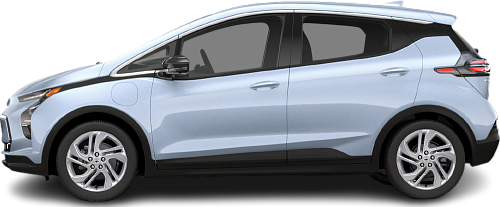Global EV Comparison: Chevrolet Bolt EV Gen 2 vs Bolt Gen 3
Struggling to Decide? Let AI Help!
Your AI Summary Is Ready!
General Info
Both vehicles have been discontinued and were never available for sale in Europe.
The two vehicles share the same body style: Hatchback.
| Property | Chevrolet Bolt EV Gen 2 | Chevrolet Bolt EV Gen 3 |
|---|---|---|
| Years of Production | 2020-2021 | 2022-2023 |
| Current Status | Discontinued | Discontinued |
| Country of Manufacture | USA | USA |
| Body Style | Hatchback | Hatchback |
| Market Availability | USA | USA |
| GCC Score | 5.2 | 5.7 |
Range and Efficiency
| Property | Chevrolet Bolt EV Gen 2 | Chevrolet Bolt EV Gen 3 |
|---|---|---|
| Range (EPA) | 417 km | 417 km |
| Range (GCC) | 396 km | 396 km |
| Battery Capacity (Nominal) | 66 kWh | 65 kWh |
| Battery Capacity (Usable) | 62.7 kWh | 61.8 kWh |
| Efficiency per 100 km | 15.8 kWh/100 km | 15.6 kWh/100 km |
| Efficiency per kWh | 6.32 km/kWh | 6.41 km/kWh |
| Range and Efficiency Score | 7.5 | 7.5 |
Charging
Both vehicles utilize a standard 400-volt architecture.
The Chevrolet Bolt EV Gen 3 (2022-2023) offers faster charging speeds at DC stations, reaching up to 55 kW, while the Chevrolet Bolt EV Gen 2 (2020-2021) maxes out at 50 kW.
The Chevrolet Bolt EV Gen 3 (2022-2023) features a more powerful on-board charger, supporting a maximum AC charging power of 11.5 kW, whereas the Chevrolet Bolt EV Gen 2 (2020-2021) is limited to 7.2 kW.
| Property | Chevrolet Bolt EV Gen 2 | Chevrolet Bolt EV Gen 3 |
|---|---|---|
| Max Charging Power (AC) | 7.2 kW | 11.5 kW |
| Max Charging Power (DC) | 50 kW | 55 kW |
| Architecture | 400 V | 400 V |
| Charge Port | CCS Type 1 | CCS Type 1 |
| Charging Score | 4.4 | 6 |
Performance
Both vehicles are front-wheel drive.
Both cars offer the same motor power, but the Chevrolet Bolt EV Gen 3 (2022-2023) achieves a faster 0-100 km/h time.
| Property | Chevrolet Bolt EV Gen 2 | Chevrolet Bolt EV Gen 3 |
|---|---|---|
| Drive Type | FWD | FWD |
| Motor Type | PMSM | PMSM |
| Motor Power (kW) | 150 kW | 150 kW |
| Motor Power (hp) | 201 hp | 201 hp |
| Motor Torque | 360 Nm | 360 Nm |
| 0-100 km/h | 7.2 s | 6.8 s |
| Top Speed | 146 km/h | 146 km/h |
| Performance Score | 3.5 | 3.6 |
Dimensions
The Chevrolet Bolt EV Gen 2 (2020-2021) and Chevrolet Bolt EV Gen 3 (2022-2023) are about the same size.
Both models have similar wheelbase lengths.
| Property | Chevrolet Bolt EV Gen 2 | Chevrolet Bolt EV Gen 3 |
|---|---|---|
| Length | 4166 mm | 4145 mm |
| Width (with Mirrors) | 2039 mm | 2039 mm |
| Width (w/o Mirrors) | 1765 mm | 1765 mm |
| Height | 1595 mm | 1611 mm |
| Wheelbase | 2601 mm | 2601 mm |
Cargo and Towing
The Chevrolet Bolt EV Gen 2 (2020-2021) features a larger trunk, but the Chevrolet Bolt EV Gen 3 (2022-2023) offers greater maximum cargo capacity when the rear seats are folded.
Neither car is equipped with a frunk (front trunk).
Neither vehicle is officially rated for towing in in the EU.
| Property | Chevrolet Bolt EV Gen 2 | Chevrolet Bolt EV Gen 3 |
|---|---|---|
| Number of Seats | 5 | 5 |
| Curb Weight | 1616 kg | 1628 kg |
| Cargo Volume (Trunk) | 479 l | 470 l |
| Cargo Volume (Max) | 1603 l | 1614 l |
| Cargo Volume (Frunk) | - Cargo Volume (Frunk) | - Cargo Volume (Frunk) |
| Towing Capacity | - Towing Capacity | - Towing Capacity |
| Cargo and Towing Score | 4.7 | 4.8 |




